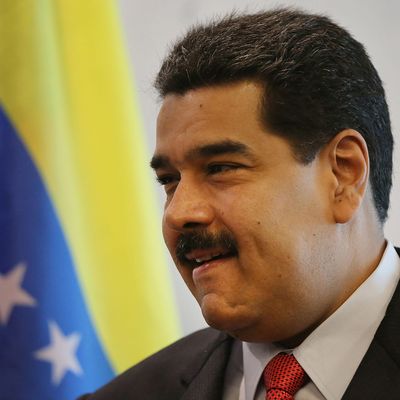
Bolivarian socialism has seen prouder days.
In Nicolás Maduro’s Venezuela, acute hyperinflation has produced food shortages so severe, 75 percent of residents have lost at least 19 pounds since their onset, according to one recent study. One third of Venezuelans eat no more than two meals a day. Maternal mortality is up 65 percent; cases of Malaria are up 76 percent. These dire conditions have produced mass protests against Maduro’s authoritarian government — and those protests have resulted in the deaths of more than 50 demonstrators, injuries to more than 1,000, and the arrests of 2,700.
And now, a regime that came to power by promising to end Venezeula’s dependence on imperialist, American institutions is looking for salvation in a deal with Goldman Sachs. As Forbes explains:
What happened is that the Venezuelan Treasury owned some bonds issued by PDVSA, the national oil company. They sold those bonds to Goldman Sachs at a serious discount to face value. It does in fact make a certain sort of sense as the Venezuelan government is currently scrambling around for cash, just any cash and cash right now.
Specifically, Goldman bought $2.8 billion in the national oil company’s bonds, for 32 cents on the dollar — a transaction that will provide Maduro’s government with an immediate infusion of a desperately needed $865 million.
The Venezuelan opposition is starting to see Chavez’s point with regard to Yankee imperialism.
“Goldman Sachs’ financial lifeline to the regime will serve to strengthen the brutal repression unleashed against the hundreds of thousands of Venezuelans peacefully protesting for political change in the country,” Julio Borges, president of the National Assembly, wrote in a letter to Goldman CEO Lloyd Blankfein.
For its part, Goldman insists that its investment in the state-owned oil company of a government that’s plunged its people into political turmoil and economic devastation is extremely ethical. For one thing, the firm made its purchase “on the secondary market from a broker and did not interact with the Venezuelan government.” For another, its decision to buy the bonds at fire-sale prices was an expression of faith in the Venezuelan people.
“We recognize that the situation is complex and evolving and that Venezuela is in crisis,” the firm said in a statement. “We agree that life there has to get better, and we made the investment in part because we believe it will.”
As Rolling Stone’s Matt Taibbi notes, the sociopolitical moral of this story is difficult to define.
It’s a good thing Karl Marx is dead, because otherwise this metaphysical mind-loop of a news story would make his head explode. Is this a corruption of capitalism, a corruption of socialism, both, or neither? Maduro himself would probably say this transaction is a perfect example of the “savage capitalism” he says he despises.
Regardless, there’s surely more that America could be doing to alleviate the humanitarian crisis in Venezuela.






























